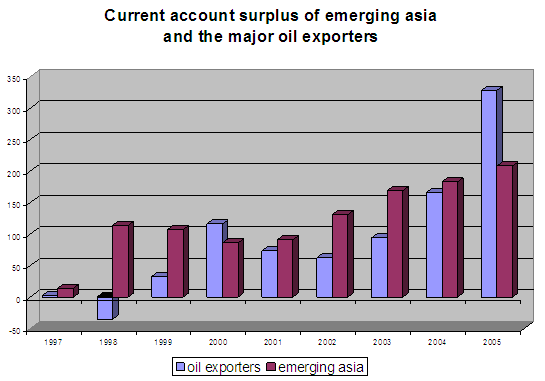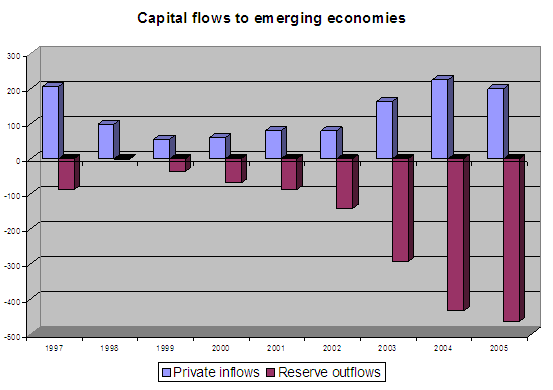It doesn’t really matter (if the oil exporters started to stash their petrodollars in Asia)
More on:
It doesn't really matter (if the oil exporters suddenly dump their savings in Asia)
I suspect Kevin Drum is right: Dubai Ports World will not, in the end, take over the US operations of P&O. Dubai Ports World polls a bit better than Dick Cheney, but only just. Think low twenties rather than high teens. I am certainly not an expert, but I find it hard to see how DPW can operate ports owned by state and city governments when the state and city governments in question don't want DPW to operate their ports. That hardly seems tenable, no matter what CFIUS concludes.
I also suspect that preventing a very wealthy emir from taking over the US operations of British company will have a far smaller impact on Arab public opinion than developments in Iraq - or, for that matter, the ongoing taint from Abu Ghraib.
Dayan Candappa of Reuters - hat tip to FTX - does suggests one reason why the US should care more about the opinion of the oil sheiks: they control an awful lot of money, and if they shifted from investing in US trophy real estate and US bonds (though intermediaries), the US might find it harder to raise the $1 trillion in external financing it now needs every year. Candappa:
Gulf governments have been diversifying their holdings across geographies and asset classes since the oil boom began.
U.S. securities still account for a bulk of the identifiable investment from OPEC oil cartel states, but their share of investable OPEC funds has fallen compared to the last oil boom in the 1970s, according the Bank for International Settlements.
And everywhere in the Gulf there are signs that petrodollars are pouring into Asia.
"Although we mustn't overplay the impact September 11 has had on the region's investors, there is a view here that assets in Asia carry a lower level of risk in purely political terms," said one wealth manager, who declined to be identified.
Others also have hinted that Gulf investors may be cooling on the US, and warming on Asia. Real Paul Blustein in today's Washington Post. Or read Henny Sender's column in the Journal. She notes that HSBC thinks Gulf money will support all emerging economies.
"Gulf liquidity will remain a source of support to emerging market asset prices for some time."
Hello, Turkey. Hello, Brazil. Hello, India. Hello, Beijing real estate (Shanghai is so 2004). Why shouldn't the portfolio of oil sheiks look like the portfolio of a certain set of hedge funds?
The funny thing: it would not really matter if the oil exporters started dumping tons of money into Asia. At least not unless Asia stopped intervening, allowed their currencies to appreciate and used the inflow to finance current account deficits, not just reserve accumulation.
Continues (with graphs!)

One country with a current account surplus cannot finance another country with a current account surplus. Or rather it can, but the inflow just leads to an increase in reserves - reserves that have to be invested elsewhere.
Consequently, a big shift in oil exporter investment toward East Asia - barring a policy change - would lead to more reserve accumulation in Asia. And more funds for the US. Amazing that.
For all the standard talk about how private markets have grown so big that they now overwhelm official flows, right now, the basic flow of capital globally is determined not by the investment preferences of private investors (even ones as rich as the gulf oil sheiks), but by the policy decisions of governments.
Consider this graph - it compares the IMF's estimates for capital flows to emerging economies with their reserve accumulation. Private capital flows to emerging markets are back at their 1997 levels.

But those private inflows are dwarfed by the capital outflow that comes from the surge in reserve accumulation by emerging economies. Since reserve accumulation exceeds private inflows, the emerging economies are, on net, financing the US.
My bottom line: until the oil exporters and Asian economies are willing to loosen their currencies ties to the dollars (or increase their spending in a big way), shifting Asian savings to the Middle East or oil savings to Asia won't have much impact on the global flow of capital. It still will flow from Asia and the Middle East to the US - though perhaps with a few more intermediate stops along the way. Barring broader policy changes, more inflows from the Middle East to Asia will lead to more Asian reserves and more Asian financing of the US. Nothing more (and nothing less).
More on:
 Online Store
Online Store